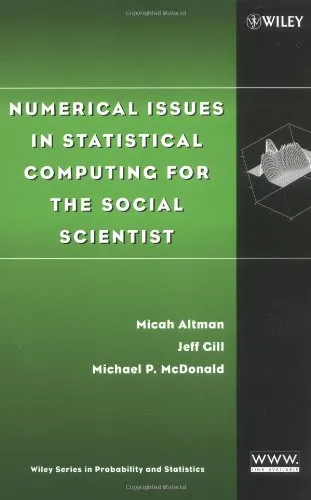Numerical issues in statistical computing for social scientist
4.0
بر اساس نظر کاربران

شما میتونید سوالاتتون در باره کتاب رو از هوش مصنوعیش بعد از ورود بپرسید
هر دانلود یا پرسش از هوش مصنوعی 2 امتیاز لازم دارد، برای بدست آوردن امتیاز رایگان، به صفحه ی راهنمای امتیازات سر بزنید و یک سری کار ارزشمند انجام بدینکتاب های مرتبط:
معرفی کتاب
کتاب "Numerical Issues in Statistical Computing for Social Scientists" یکی از منابع برتر و حیاتی در زمینه محاسبات عددی و کاربردهای آماری است که به خصوص برای پژوهشگران علوم اجتماعی طراحی شدهاست. این کتاب توسط Micah Altman، Jeff Gill، و Michael P. McDonald نوشته شده و تلاش میکند تا با توضیحات واضح، نمونههای کاربردی، و کدهای برنامهنویسی کامل، محتوایی جامع و ارزشمند را به خوانندگان ارائه دهد.
خلاصهای از کتاب
این کتاب به شکلی سیستماتیک به موضوعاتی پرداخته که در بیشتر موارد پژوهشگران با آنها درگیر هستند، همچون چالشهای عددی در تحلیلهای آماری، دقت عددی، و مشکلات محاسباتی که میتوانند بر نتایج تحقیقات تأثیر بگذارند. نویسندگان از آغاز با معرفی مفاهیم اساسی در محاسبات و آمار شروع کرده و سپس به بررسی دقیقتر تکنیکهایی نظیر الگوریتمهای عددی، تحلیل دادهها و نرمافزارهای آماری میپردازند.
یکی از ویژگیهای برجسته کتاب، ساختار آن است که خوانندگان را از مباحث پایه به سمت موضوعات پیشرفته تر هدایت میکند، و در هر مرحله، مباحث جدیدتر و پیچیدهتر را با مثالها و کدهای واقعی همراه میسازد.
نکات کلیدی
- توضیح دقیق Numerical Precision و تأثیر آن بر تحلیلهای آماری
- نقد و بررسی شیوههای مختلف محاسبات عددی و انتخاب بهترین روشها
- روشهای تصحیح خطا در پردازشهای آماری
- بررسی نرمافزارهای آماری و نحوه استفاده بهینه از آنها
- ارائه کدهای نمونه به زبانهای مختلف برنامهنویسی برای کاربرد فوری
نقلقولهای معروف از کتاب
"مقدار واقعی عددیای که به ابزار خود میدهید نهایتاً بر دقت محاسبات شما تأثیر خواهد گذاشت."
"در تحلیلهای آماری قابل اعتماد، توانایی تشخیص و رفع خطاهای عددی از اهمیت وافری برخوردار است."
چرا این کتاب اهمیت دارد؟
در جهانی که تحلیلهای آماری نقشی پررنگ و اساسی در تصمیمگیریهای کلان اجتماعی و سیاسی ایفا میکنند، درک عمیقتر چالشهای محاسباتی و عددی میتواند به بهبود کیفیت و صحت این تحلیلها کمک کند. این کتاب نه تنها به ارائه راهنماییهای عملی برای بهبود دقت در محاسبات میپردازد، بلکه به وسیلهی ارائه مثالهای کاربردی و توضیحات کاملاً شفاف، سطح دانش آماری خوانندگان را نیز ارتقا میدهد. بهرهگیری از چنین منبع معتبری میتواند ابزارهای لازم برای اجرای پژوهشهای دقیقتر و علمیتر را در اختیار مخاطبان قرار دهد.
Welcome to an in-depth exploration of 'Numerical Issues in Statistical Computing for Social Scientists,' a pivotal resource that seamlessly bridges the worlds of numerical algorithms and social science research. Authored by Micah Altman, Jeff Gill, and Michael P. McDonald, this book delves into the essential computational challenges faced by social scientists and equips them with the knowledge to tackle these issues effectively.
Detailed Summary of the Book
The realm of social science research relies heavily on statistical computing, which involves applying numerical methods to vast datasets to derive meaningful insights. This book addresses the critical gap between theoretical statistical methods and their practical application through computational means. Social scientists often encounter specific numerical challenges, such as estimation errors, convergence problems, and data precision issues. By concentrating on these computational hurdles, this book provides a roadmap to better understand and implement numerical solutions.
Structured into distinct sections, the book begins with an overview of foundational concepts in numerical analysis, tailored specifically for the unique data types and models used in social sciences. The authors provide an intricate look at major issues like numerical instability, matrix operations, and optimization problems. Moreover, the book covers software considerations, guiding users on how to leverage statistical packages and programming languages to perform robust analyses. Through real-world cases and simulations, it translates abstract numerical methods into tangible social science research improvements.
Key Takeaways
Numerical Issues in Statistical Computing for Social Scientists is not just an academic textbook; it's a practical guide that offers several key takeaways:
- Understanding the Importance of Numerical Methods: Gain insights into how numerical methods integrate into statistical modeling and why they matter in research accuracy.
- Implementation of Algorithms: Learn how to implement these techniques using popular statistical software and programming languages, making complex computation more accessible.
- Addressing Common Pitfalls: The book highlights common errors in numerical computing and educates readers on how to avoid and rectify them.
- Case Studies and Examples: Real-world applications of numerical solutions in social science research make abstract concepts concrete and applicable.
Famous Quotes from the Book
“Numerical methods are crucial to bridging the considerable gap between statistical theory and empirical data analysis.”
“Understanding the fundamentals of computational precision and error provides researchers with the insights needed to improve data accuracy.”
Why This Book Matters
In the rapidly evolving landscape of social sciences, the ability to efficiently process and analyze large datasets is more crucial than ever. Numerical Issues in Statistical Computing for Social Scientists fills an educational and practical gap by focusing on the intersection of computational science and statistical theory within the context of social science. This book is indispensable for researchers and practitioners who want to elevate the precision and reliability of their work through a better understanding of numerical computations.
Moreover, as we continue to amass larger datasets and explore more complex models in social sciences, having a firm grasp on the numerical challenges and solutions becomes increasingly critical. This book prepares social scientists not only to perform their analyses efficiently but also to innovate in their research methodologies and to interpret their findings with enhanced fidelity.
دانلود رایگان مستقیم
شما میتونید سوالاتتون در باره کتاب رو از هوش مصنوعیش بعد از ورود بپرسید
دسترسی به کتابها از طریق پلتفرمهای قانونی و کتابخانههای عمومی نه تنها از حقوق نویسندگان و ناشران حمایت میکند، بلکه به پایداری فرهنگ کتابخوانی نیز کمک میرساند. پیش از دانلود، لحظهای به بررسی این گزینهها فکر کنید.
این کتاب رو در پلتفرم های دیگه ببینید
WorldCat به شما کمک میکنه تا کتاب ها رو در کتابخانه های سراسر دنیا پیدا کنید
امتیازها، نظرات تخصصی و صحبت ها درباره کتاب را در Goodreads ببینید
کتابهای کمیاب یا دست دوم را در AbeBooks پیدا کنید و بخرید
1458
بازدید4.0
امتیاز0
نظر98%
رضایتنظرات:
4.0
بر اساس 0 نظر کاربران
Questions & Answers
Ask questions about this book or help others by answering
No questions yet. Be the first to ask!














